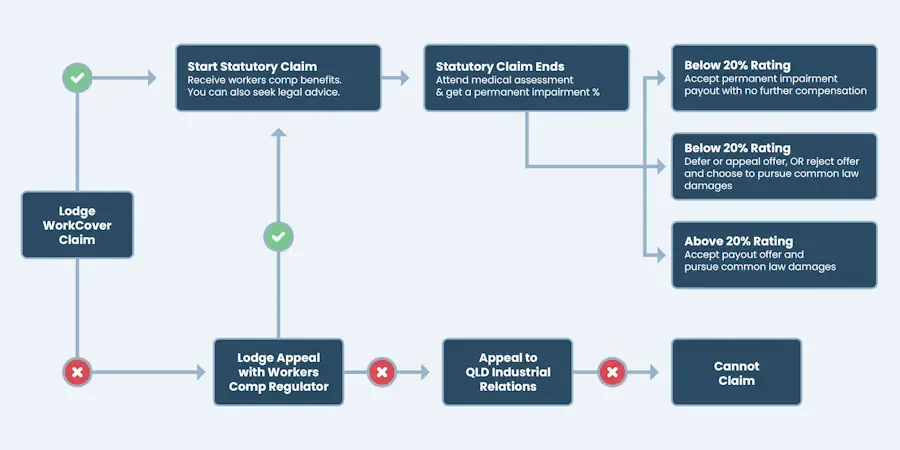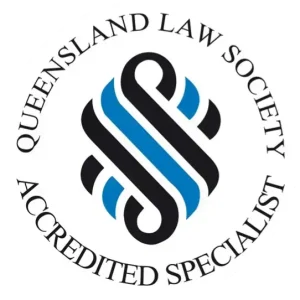In Queensland, you might be eligible to claim a workers’ compensation payout when you have experienced a new or worsened mental health condition or psychological injury at work. In such cases, our qualified workers’ compensation lawyers can offer legal advice regarding WorkCover claims, including your right to seek:
The Workers Compensation Lawyers QLD provides a free case review for mental injury claims that can explain your legal position and recommended next steps. Additionally, we offer a no-win, no-fee, no-risk guarantee on all of our legal services. It’s free to know where you stand.
Check it out!
If you’re struggling with a diagnosed mental illness such as:
or other recognised mental health conditions caused by your work environment (or employer negligence), you may be eligible to claim mental health workers’ compensation benefits and support.
An injured worker must meet these essential requirements to qualify for workers’ compensation for psychological injury:
Our WorkCover compensation lawyers can explain how to meet the eligibility requirements, your rights, and entitlements during a free initial consultation. Call 1800 575 023
If you have been diagnosed with a new or worsened mental injury and your job is a significant contributor to the injury, you may be eligible to make a workers’ compensation claim.
You could meet the eligibility requirements if you are one of the following:
Queensland employers have a general responsibility to provide a safe workplace, including taking reasonable steps to prevent physical and psychological injuries. If they fail to do so, the Workers’ Compensation and Rehabilitation Act 2003 protects your right to access support and compensation.
Your rights regarding work-related mental injury claims include the following:
Our Brisbane-based workers’ compensation lawyers offer free initial legal advice throughout Queensland. Our free legal case review can explain the following:
Pay only for a win and zero if you lose. It’s free to learn your options. Call 1800 575 023
In Queensland, workers’ compensation for psychological injury could cover any recognised mental health condition that arises primarily from workplace factors, including the following:
The state workers’ compensation scheme covers:
Approved claimants could access workers’ compensation benefits such as
WorkCover could provide treatment payments for psychological injuries even before a claim is decided (when it is associated with a physical injury). Furthermore, if a claim is denied, workers usually do not have to repay the cost of psychological treatment already received.
They can also offer support, such as access to early treatment options, to help you return to your everyday life.
Workers in emergency services, healthcare, and other high-stress industries often face elevated risks, with some Australian states (including Queensland) providing special provisions.
As a result, first responders don’t need to establish that work was a significant contributing factor. Their work is assumed to have caused the injury until proven otherwise.
Learn your entitlements
Living with work-related injuries can mean you have limited funds, and the cost of qualified legal advice is out of reach.
The Workers Compensation Lawyers QLD offer a genuine 100% no-win, no-fee guarantee for all work-related mental injury legal services. Our no-financial-risk policy means the following:
Our Queensland workers’ compensation lawyers can explain your entitlements and our No-Fee funding policy during a free case review. Call 1800 575 023
An employee with any recognised psychiatric disorder acquired in a workplace environment could qualify to receive workers’ compensation. However, there are some common categories, including:
You could qualify to receive mental health workers’ compensation if you experience severe stress that results in a diagnosed mental health condition, such as adjustment disorders or severe anxiety and depression. These conditions can be linked to:
Common industries with high stress-related work environments include healthcare, emergency services, and education.
Workplace bullying and harassment are common causes of serious mental health claims in Australia. This unwanted behaviour often leads to psychological issues in the targeted employees. Systematic bullying by colleagues or supervisors can cause anxiety, depression, and in severe cases, suicidal thoughts. An approved bullying claim usually requires:
Queensland employers who fail to address reported bullying complaints can be held accountable when their negligence becomes a significant contributing factor to the worker’s psychological dysfunction.
PTSD (Post-traumatic stress disorder) claims can typically arise from exposure to traumatic events in the workplace, as either
Workers in emergency services and first responders often face a higher risk of psychological damage due to regular exposure to violence, critical incidents, and human suffering. Common occupations include the following:
Workers who experience vicarious trauma can also qualify for compensation. Repetitive exposure to the suffering of others can trigger this diagnosable mental health condition in workers. For example:
A single traumatic incident, such as workplace violence or a serious accident, can cause immediate psychological harm that requires urgent mental health support. However, early intervention and the right support can lead to better recovery results and lower the chances of developing chronic mental illness.
Accordion Content
The payout for workers’ compensation claims related to psychological injuries varies significantly depending on the type of claim and several factors, including:
Approved WorkCover mental injury claims can provide compensation that includes the following:
The Workers Compensation Lawyers QLD can explain your eligibility and entitlements during free initial legal advice. Call 1800 575 023

When you are nearing the end of a statutory workers’ compensation claim, you may be eligible to pursue common law claims for additional damages if employer negligence contributed to a mental injury.
To achieve a settlement, QLD personal injury laws require the claimant to prove that their employer breached their duty of care by failing to prevent foreseeable psychological harm.
Common law settlements take into account more factors than statutory claims, including both economic and non-economic damages, such as:
Successful common law claims require demonstrating that:
The employee has the burden of proving their employer’s duty failure, which is higher than in statutory workers’ compensation claims. Consequently, they must have extensive evidence regarding workplace policies, training, and responses to complaints.

Your treating psychologist or psychiatrist may provide detailed reports that show:
WorkCover might require an independent medical examination, especially for psychological injury claims, which are typically examined more carefully than physical injury claims. Therefore, solid supporting evidence from your treating practitioners can help defend against any negative opinions from insurer-appointed doctors.
You have the right to seek legal advice from workers’ compensation lawyers for psychological injury claims. Typically, workers’ compensation insurers are more vigorous in defending mental health claims. A qualified work injury lawyer understands their techniques and what is required to achieve an approved claim.
Experienced personal injury lawyers can:
In Queensland, workers’ compensation psychological injury claims are more difficult to prove (than physical injuries) because a mental injury is not visible. So, for a claim to be successful, it needs to be based on a proper medical evaluation by a qualified medical practitioner.
Generally, the workers’ compensation insurer considers a formal diagnosis from a psychiatrist or psychologist more reliable than one from a GP or local doctor.
The key steps of the mental injury claim process include:
Psychological injury recovery has special obstacles compared to physical workplace injuries because:
Common recovery challenges include:
The unpredictable nature of psychological symptoms can make it difficult to establish stable return-to-work arrangements. What seems manageable one day may become overwhelming the next, which means you also need a flexible approach while receiving treatment.
You generally need careful planning and support to successfully return to work after a mental injury with input from your employer and medical practitioner. A graduated return-to-work arrangement will often prove more effective than attempting to return to full-time employment immediately. Key strategies include the following:
Treatment and support don’t hurt your claim—in fact, taking action with appropriate services often strengthens a case by showing the genuine effects of a workplace psychological injury.
Beyond legal and medical support, various organisations provide assistance for workers dealing with psychological injuries:
Employee Assistance Programs: Many employers offer confidential counselling and support services through EAP providers, though these shouldn’t replace formal medical treatment for serious psychological injuries.
Mental Health Organisations: Groups like Beyond Blue and Lifeline provide crisis support and resource information for people experiencing mental health difficulties.
Union Representatives: If you’re a union member, local representatives can provide guidance on workplace rights and compensation for your industry
Support Groups: Connecting with others who’ve experienced similar psychological injuries can provide valuable emotional support and practical advice throughout the recovery process.

Kerry Splatt – Law Firm Principal
An experienced workers’ compensation lawyer is familiar with the laws regarding work injury claims and the QLD WorkCover insurance scheme. They know how to prove psychological injury claims, including the required medical reports and assessments that support a work injury case.
The Workers Compensation Lawyers QLD offer a free case review that can explain your rights and entitlements for psychological injury claims.
All our WorkCover legal services come with a genuine no-win, no-fee, no-risk guarantee. Pay only after a win, and zero if you lose. It’s free to learn where you stand. Call 1800 575 023

A psychological injury at work includes any recognised and diagnosable mental health condition caused by the work environment or job factors. Common conditions include:
Comprehensive documentation can include the following:
Typically, the employee has the burden of proof when claiming workers’ compensation. For this reason, you will likely need evidence from a qualified medical practitioner and a work injury lawyer to support the legal process.
In Queensland, most psychological injury claims are settled through mediation, and the outcome is confidential, so it can be challenging to know the value of lump sum compensation payments.
However, WorkSafe regularly publishes statistics for the QLD workers’ compensation scheme regarding the average payout for work-related psychological injuries. This data shows there is a significant variation based on individual circumstances.
You could take legal action against your employer’s insurance company when their negligence causes you a mental injury with a related financial loss. Eligibility to pursue common law damages depends on the level of impairment and a clear causal link between:
You might be eligible to claim compensation for stress and anxiety if:


